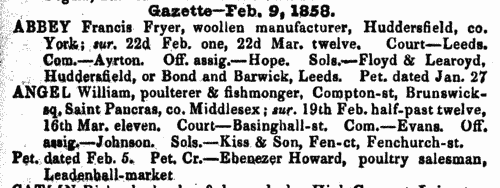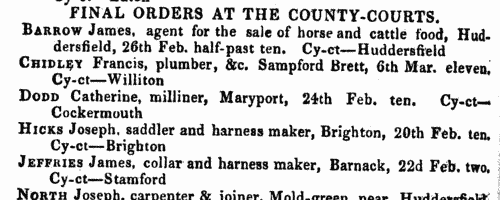Add this eBook to your basket to receive access to all 1,064 records. Our indexes include entries for the spelling underwood. In the period you have requested, we have the following 1,064 records (displaying 721 to 730): These sample scans are from the original record. You will get scans of the full pages or articles where the surname you searched for has been found. Your web browser may prevent the sample windows from opening; in this case please change your browser settings to allow pop-up windows from this site.  British infantry fighting in China
(1856-1858) British infantry fighting in China
(1856-1858)
The China Medal was awarded to soldiers and sailors who took part in the prosecution of the war against the Chinese from 1856 to 1860. Separate clasps were awarded for men who had been in receipt of the China Medal of 1842; for being actually present at Canton on 28 and 29 December 1857, when that city was bombarded and finally captured; for being actually engaged in the operations which ceased with the first capture of the Taku Forts, 20 May 1858, and led to the Treaty of Tientsin; for being actually present at the capture of the Taku Forts 21 August 1860; and for being actually present before Pekin the day the gate of that city was given up to the allied (British and French) army, viz. on 13 October 1860. The 59th (The 2nd Nottinghamshire) Regiment of Foot, based at Athlone, embarked from Ireland to Hong Kong 12 June 1849, and remained in China until 1858, not returning to Britain until 1865. The regiment took part in the capture of Canton. | Sample scan, click to enlarge

| Anglican Clergy in England and Wales
(1858)
The Clergy List for 1858 includes this comprehensive list of Anglican clergymen in England and Wales, whether beneficed or not. The names are arranged alphabetically by surname, and christian name or initials, with degree, and current office. | Sample scan, click to enlarge

| Assignees of bankrupts' estates in England and Wales
(1858)
Perry's Bankrupt and Insolvent Gazette, issued monthly, included lists of assignees of bankrupts' estates. Each entry gives the name of the bankrupt (surname first, in capitals), and trade; followed by the names, addresses and trades of the assignees to whom the estate was delivered. This is the index to the names of the assignees, from the issues from January to December 1858. | Sample scan, click to enlarge

| Bankrupts' Estates
(1858)
Bankrupts' estates for England and Wales vested in assignees: bankruptcy often caused people to restart their lives elsewhere, so these are an important source for lost links
| Sample scan, click to enlarge

| Bankrupts in England and Wales
(1858)
Perry's Bankrupt and Insolvent Gazette, issued monthly, included lists of bankruptcies and stages in the liquidation of the estate, payment of dividends, and discharge. The initial entry in this sequence gives the name of the bankrupt (surname first, in capitals), the date gazetted, address and trade (often with the phrase dlr. and ch., meaning dealer and chapman); the dates and times and courts of the official processes of surrender; the surname of the official commissioner (Com.); the surname of the official assignee; and the names and addresses of the solicitors; the date of the fiat; and whether on the bankrupt's own petition, or at the demand of petitioning creditors, whose names, trades and addresses are given. In subsequent entries the bankrupt is often merely referred to by name and trade. This is the index to the names of the bankrupts, from the issues from January to December 1858, which may or may not include the detailed first entry for any particular individual. | Sample scan, click to enlarge

| Insolvents
(1858)
Insolvency notices for England and Wales: insolvency often caused people to restart their lives elsewhere, so these are an important source for lost links | Sample scan, click to enlarge

| Insolvents in England and Wales
(1858)
Perry's Bankrupt and Insolvent Gazette, issued monthly, included lists of insolvencies and stages in the process whereby the insolvents petitioned for release from debtors' prison. The insolvent is generally referred to by name (surname first), address and trade. This is the index to the names of the insolvents, from the issues from January to December 1858. | Sample scan, click to enlarge

| Civil Service Certificates
(1859)
The Civil Service Commission published this annual list of all persons who had obtained certificates of qualification for appointment in the various public departments. The list gives full name (surname first); department (such as Post Office, or Inland Revenue); situation (such as Letter-carrier, or Clerk); and date of certificate. Candidates whose names are preceded by a dagger obtained appointments as the result of competition. A double dagger shows those who obtained their appointments as the result of open competition. Those whose names are preceded by an asterisk obtained honorary additions to their certificates either for proficiency in extra subjects chosen by themselves, or for marked proficiency in the prescribed subjects.
| Sample scan, click to enlarge

| Unclaimed Naval Prize Money from the China War
(1856-1860)
Various prize moneys were awarded to officers and men who served on board her Majesty's ships on the China Station during the war of 1856 to 1880. Firstly, there was a parliamentary grant of one month's pay to those serving on the Acorn*, Actaeon*, Adventure, Algerine*, Amethyst, Assistance*, Banterer*, Barracouta, Belleisle, Bustard, Calcutta*, Camilla, Clown*, Comus, Cormorant, Cruiser*, Drake*, Elk*, Encounter, Esk*, Firm*, Forester*, Furious*, Fury, Haughty*, Hesper*, Highflyer*, Hornet*, Inflexible*, Janus*, Kestrel*, Lee*, Leven*, Melville, Minden, Nankin*, Niger*, Nimrod*, Opossum*, Pique, Plover*, Princess Charlotte, Racehorse*, Raleigh, Sampson*, Sans Pareil*, Slaney*, Spartan, Starling*, Staunch*, Surprise*, Sybille*, Tribune, Volcano*, Watchful*, Winchester, and Woodcock*; in addition Canton booty was awarded to those serving on the ships asterisked (plus the Bittern and Coromandel tenders) at Canton on 28 and 29 December 1857, when that city was bombarded and captured. Then those on board the Bustard, Cruiser, Esk, Forester, Haughty, Highflyer, Lee, Niger, Nimrod, Sampson, Surprise, and the boats of the Elk, were rewarded for the captures of junks for breach of blockade of Canton River between 29 August and 19 December 1857. Other captures made by her Majesty's ships led to various other awards distributed between 1 January 1855 and 19 February 1863. Nevertheless, for one reason or another a substantial number of these prizes, from as little as 1s 7d to as much as £28, remained undistributed by 1902, when this comprehensive list of the unclaimed moneys was printed. In each case the sailor's name is given first (surname, then christian name or initials); rank or rating; ship in which serving at time of capture or award; parliamentary award; Canton booty; captures for breach of blockade of Canton River; other captures; and then the total. | Sample scan, click to enlarge

|  British infantry fighting in China
(1860) British infantry fighting in China
(1860)
The China Medal was awarded to soldiers and sailors who took part in the prosecution of the war against the Chinese from 1856 to 1860. Separate clasps were awarded for men who had been in receipt of the China Medal of 1842; for being actually present at Canton on 28 and 29 December 1857, when that city was bombarded and finally captured; for being actually engaged in the operations which ceased with the first capture of the Taku Forts, 20 May 1858, and led to the Treaty of Tientsin; for being actually present at the capture of the Taku Forts 21 August 1860; and for being actually present before Pekin the day the gate of that city was given up to the allied (British and French) army, viz. on 13 October 1860. The 1st battalion, the 3rd (East Kent) Regiment of Foot (the Buffs), based in Limerick, embarked for Malta 2 April 1851. The battalion took part on in the capture of the Taku Forts. | Sample scan, click to enlarge

|
Research your ancestry, family history, genealogy and one-name study by direct access to original records and archives indexed by surname.
|












